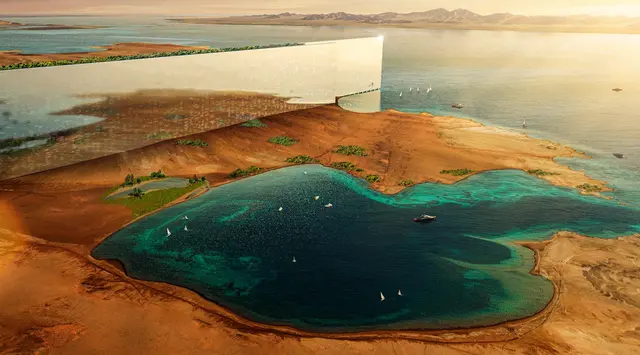
May 03, 2023 • Economics
The Line is Saudi Arabia's Bold Leap into a Futuristic, Post-Oil Reality
A Dazzling Futuristic City or a Mirage in the Desert of Ambitious Dreams?

In a world where countries seem to be constantly in competition to create the most mind-boggling projects, Saudi Arabia has decided to throw its hat into the ring. I present to you "The Line," a futuristic mega-city that stretches 170 kilometers (roughly 105 miles) from the Red Sea coast into the Arabian Desert. I can't help but wonder if someone in the planning department has been playing a bit too much SimCity.
When it comes to the size and cost of The Line, we're looking at some staggering figures. With an estimated budget of $500 billion, this ambitious project is set to create a carbon-free, AI-driven city that promises to revolutionize urban living. The city will be powered by 100% renewable energy and is expected to house a million residents. It's like someone said, "Hey, let's take all the sci-fi movie concepts and turn them into reality."
But who's going to build this modern-day utopia? Well, Saudi Arabia's very own Public Investment Fund (PIF) is the mastermind behind the project. With Crown Prince Mohammed bin Salman at the helm, the PIF is working with international partners and investors to bring this ambitious dream to life. I'm sure the construction crews will appreciate the change of scenery, from the desert sands to a city that resembles a futuristic oasis.
Now, let's talk about the elephant in the room – how on Earth are they going to pay for this behemoth of a project? With oil prices having their own rollercoaster ride and the kingdom's main source of income facing an uncertain future, one might think they'd be more frugal. But no, they've decided to diversify their economy with a city that looks like it belongs in a Star Wars movie. Funding will come from a mix of the Saudi government, the PIF, and a plethora of private investors enticed by the project's potential.
So, why is Saudi Arabia attempting to build the city of the future? The answer lies in the kingdom's realization that their oil reserves won't last forever. As the world moves towards renewable energy sources, Saudi Arabia is looking to reduce its reliance on oil and transform itself into a global investment powerhouse. The Line is the crown jewel of their Vision 2030 plan, a blueprint for a post-oil future. And let's be honest, what better way to make a statement than building a city that's longer than the distance between New York City and Philadelphia?
Of course, we can't talk about The Line without asking the burning question: who's going to live there? Saudi Arabia is pulling out all the stops to attract the wealthy and elite, offering them a life of luxury and low taxes. It's like a siren call to the affluent, who can't resist the sweet melodies of financial incentives and opulence. The kingdom is even taking a leaf out of London's book by deregulating its financial sector to lure in firms, hoping to transform The Line into an economic powerhouse.
The darker side of this glitzy project: Saudi Arabia's track record with human rights and construction-related deaths has been a cause for concern. With migrant workers often facing appalling working conditions and limited legal protection, there's a looming question over whether The Line can avoid the same pitfalls. Will the kingdom ensure that the city of the future is built on a foundation of fairness and equity, or will it be tainted by the same issues that have plagued other projects? The world will be watching closely, with bated breath and furrowed brows.
The Line is a project of epic proportions – a combination of ambition, innovation, and a dash of audacity. As Saudi Arabia seeks to secure its place in a post-oil world, it's making a bold statement with this futuristic city. But will it manage to overcome the challenges of attracting residents, ensuring the well-being of its workforce, and creating an equitable society within its boundaries? We'll just have to wait and see.




